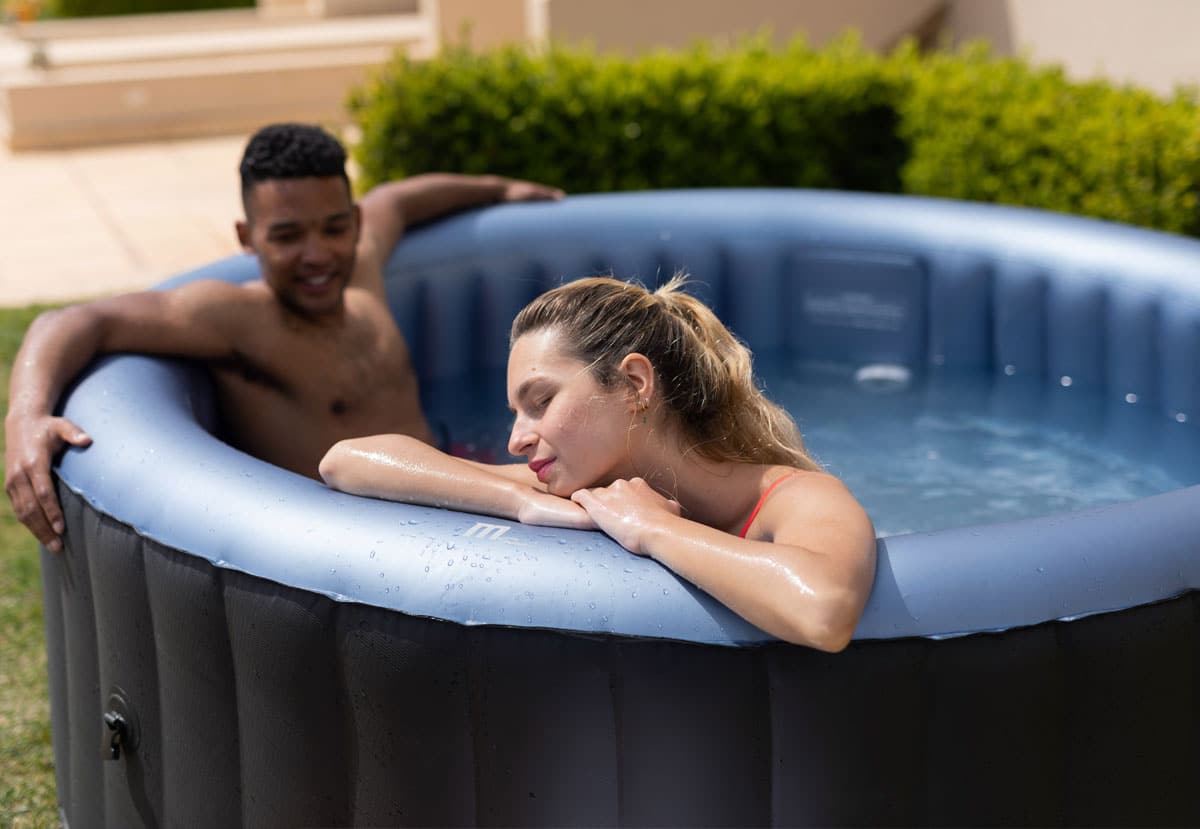You sit back and relax as the hot water envelops you, easing away your sore muscles – have you ever stopped to think about the health benefits of a hot tub?
Soaking in a hot tub can offer so much more than just a soothing experience; from helping with mental health to aiding with digestion, learn more about why soaking in a hot tub is beneficial for your health.

The hot tub has long been a favorite relaxation device due to either its therapeutic effects on the body’s tensions, its pleasant warmth, or both. According to research studies and user reviews, this trusted therapy can offer a host of additional benefits to those who enjoy frequent soaks. This guide will explore the many potential health advantages that can be gained from regular use of a hot tub.
Not only is soaking in your hot tub a sublimely indulgent experience that soothes your mind and body, it also offers an array of physical benefits that can help maintain your overall wellbeing. The combination of warm water and deep massage offered by hydrotherapy can help reduce stress and anxiety levels while providing relief from joint pain and muscle soreness. It has also been noted that hydrotherapy helps enhance blood circulation, improve cardiovascular health and boost energy levels due to improved oxygen intake.
For those with respiratory ailments or strained muscles, hot tubs are often found to be helpful in improving conditions on both fronts. A variety of jets target particular areas of the body offering a strong yet gentle massage as part of the hydrotherapy experience practical for relieving related pains while simultaneously improving breathing problems caused by allergies or illnesses such as asthma.
Definition of hot tub
A hot tub is a large container filled with hot water, often accompanied by helpful jets of air or water that allow users to relax and soak. Generally, the water level should come up to your shoulders when you’re seated. Most hot tubs can fit two to seven people, depending on size. Hot tubs are similar to Jacuzzis or spas, though many people reserve the terms Jacuzzi and spa for indoor fixtures with jets designed for hydrotherapy massage. In comparison, hot tubs are generally located outdoors and have been specifically designed for recreational use rather than therapeutic massage.
Hot tub temperatures range from 98-104 degrees Fahrenheit (36- 40 degrees Celsius), allowing users to choose the temperature they desire according to their individual preferences. People often choose a cooler temperature during warm weather but opt for a hotter bath during colder months when they may spend extra time soaking in the tub. The ideal temperature will depend on individual comfort levels, but typically any temperature within that range provides relaxation while creating an atmosphere conducive to increased health benefits.
Brief explanation of the health benefits of soaking in a hot tub
Soaking in a hot tub affords several potential health benefits, from providing relief from chronic pain to improving the quality of your sleep. Studies have linked the temperate water and buoyancy of a hot tub with improved mental and physical health.
When referring to the therapeutic benefit of hot tubs, we are usually referring to warm hydrotherapy – the practice of using water and pressure to relieve muscle tension. Hot tubs can offer many different varieties of this practice including underwater massage, bubble baths, and chlorine baths. Hydrotherapy is known to promote relaxation, reduce pain, relax muscles, help reduce inflammation and improve circulation.
The warmth of a hot tub also provides excellent stress relief. The jet streams circulate through the body at varying pressures which helps stimulate blood flow, which can reduce feelings of fatigue. Furthermore, studies have shown that soaking in a hot tub also promotes better mental clarity by helping you relax as well as providing an atmosphere conducive towards contemplation or meditation.
Other potential benefits include: increasing flexibility and joint range of motion; helping speed up recovery post-exercise; reducing insomnia; supporting weight loss; aiding cardiovascular health; boosting metabolism and digestion; aiding lymphatic system function; improving sleep quality; stimulating production from hormones responsible for sex drive; detoxifying your body with magnesium sulfate (Epsom) salt baths; and promoting skincare through increased blood flow throughout your body’s largest organ -the skin!
Purpose of the guide
This guide is designed to provide you with the information you need to understand the health benefits of soaking in a hot tub. Hot tubs have been used for centuries to promote relaxation, reduce stress, and alleviate certain physical ailments.
This guide will discuss how hot tubs can help with a variety of conditions, including chronic pain and emotionally-based issues like depression and anxiety, as well as showcase some of the important safety guidelines that should be followed when using them.
Whether you are looking to ease muscle soreness after workouts or regain mobility after an injury, or just looking for an alternative way to relax and alleviate stress, this guide will help you determine if a hot tub is right for you and explain what steps should be taken before using one for therapeutic purposes.
Health Benefits of Soaking in a Hot Tub
Soaking in a hot tub can provide many health benefits, including increased relaxation and stress relief, improved circulation, and improved sleep quality.
When you sit in warm water, your muscles naturally relax. This allows your body to release tension, reducing stress levels and helps to reduce the body’s response to physical and emotional stressors. Additionally, hot tubs contain jets of hydrotherapy that massage the body’s muscles, providing relief for soreness and tension in areas such as the neck and back.

Hot tubs naturally cause increased circulation throughout the body by causing water to move around you at a higher pressure than normal swimming pools. The increased circulation helps improve oxygen flow throughout every muscle group which leads to better recovery time from workouts or strenuous activities.
Increased relaxation due to soaking in a hot tub (especially before bedtime,) has also been shown to improve sleep quality by helping people fall asleep faster with fewer interruptions throughout the night. Soaking in a hot tub can also help reduce issues caused by insomnia over time.
Improved circulation and blood flow
Soaking in a hot tub can have numerous positive effects on your cardiovascular system. When hot tub temperatures around 103-104 degrees Fahrenheit are maintained, it can cause arteries to dilate, increasing circulation and improving blood flow to all parts of the body. It also helps reduce muscle spasms and stiffness, which might be due to inflammation caused by tissue damage or reduced movement.
As well as improving circulation, it helps warm the body up, which can improve overall function and reduce pain sensations associated with coldness. Immersion in a hot tub helps further relax muscles, allowing them more time to repair after workouts or active days out. Studies have also shown that even just 10 minutes of soaking in hot water can help reduce blood pressure levels due to the vasodilation effect on the circulatory system.
Soaking in a hot tub is not only beneficial for those with high blood pressure problems but for anyone who wants to improve their heart health.
Relieved muscle and joint pain
Soaking in a hot tub is known for its ability to temporarily decrease pain and swelling due to sore muscles and joint conditions such as arthritis. The buoyancy of the water helps reduce stress on the joints and ligaments, making movement easier and reducing pain.
Additionally, hydrotherapy has been found to improve muscle mobility, increase circulation, reduce inflammation, relax tense muscles, and promote better sleep. Soaking in a hot tub can also offer psychological benefits such as improved mood and clarity of thought by providing an opportunity for reflection and relaxation. The hot water increases the body’s temperature which can stimulate endorphins which are known to reduce pain and create a feeling of wellbeing.
Soaking in a hot tub is also known to help treat some chronic health conditions such as uncontrolled blood pressure by aiding relaxation or regulating sleeping patterns. Furthermore, people with certain skin conditions may find that soaking in a hot tub helps alleviate symptoms because warmth helps open pores which allows dirt or other residue on the skin’s surface to be released more easily.
Reduced stress and anxiety
Hot tubs are widely recognized as a source of instant relaxation due to their calming effects on the mind and body. Soaking in warm water can help reduce stress levels and provide relief from mental strain associated with hectic lifestyles. Many people report a feeling of tranquility and wellbeing after bathing in a hot tub.
The physical relaxation brought about by soaking in hot water causes the body to enter a state of restfulness that helps reduce stress levels, anxiety, and tension. This can contribute to an improved emotional state as well as better sleep quality. Soaking in a hot tub for at least 15 minutes is also known to increase endorphin levels which can further dismiss feelings of sorrow or gloominess brought about by stress.
Additionally, the combination of warm water and buoyancy may help to relieve some muscle tension associated with anxiety or depression which adds to its therapeutic effects. When used regularly for its therapeutic benefits, soaking in hot water can be an effective method for reducing and managing stress, anxiety, muscle aches, fatigue, depression, and more!
Improved sleep
Soaking in a hot tub before bedtime can help improve sleep quality by inducing a feeling of calm and relaxation. The warm water helps to relax tense muscles, allowing you to drift off to sleep more easily.
In addition to improved sleep quality, research studies link regular hot tub use with improved overall health, including lower heart rate and blood pressure. Soaking in hot water is thought to stimulate the release of endorphins — hormones that act as the body’s natural painkiller — and promote relaxation. By easing physical and mental stress, soaking in a hot tub can help your body recuperate after exertion and reduce anxiety levels.
Improving circulation also has positive health benefits — it increases your metabolism and enhances nutrient absorption, making it possible for your body to better utilize vitamins and minerals from food sources. When combined with light exercise sessions held underwater, this process is further amplified.
Reduced symptoms of certain medical conditions
Various medical issues can be eased with the use of a hot tub. Soaking in a hot tub with moderate warm water temperatures can help reduce the symptoms associated with conditions such as arthritis, inflammation and joint pain.
A hot tub’s heat and buoyancy helps to reduce the weight burdens in the joints while its massaging effect aids those suffer from muscle tension and fatigue chemicals produced within the body known to cause these issues. In addition, research has found that soaking in a hot tub before bedtime may promote better sleep due to deep relaxation.
Hot tubs have been proven to improve mental health such as reducing depression, stress and anxiety.
Improved skin health
Soaking in a hot tub, also known as hydrotherapy, can lead to improved skin health. This is because the hot water helps open the pores of your skin, allowing for toxins and other impurities to be released. Additionally, the increased circulation from soaking allows for a greater turnover rate of cells, leading to healthier skin overall.
Improvements in skin conditions are possible due to the impact hot tubs can have on infections and inflammation. Due to their temperature, hot tubs help reduce inflammation throughout your body which can lead to improvement with certain skin disorders like psoriasis or eczema. Additionally, hot water has antiseptic properties which can reduce bacteria that can cause infections like acne or athlete’s foot. Finally, sweating caused by immersion in a hot tub helps flush out toxins through sweat which could lead to an improvement in overall skin health.
III. How to Use a Hot Tub Safely and Effectively
In order for hot tub bathing to be beneficial for your health, it’s important to know how to use a hot tub safely and effectively. Depending on the temperature you set, hot tubs can cause you to become overly refreshed and dehydrated. To use a hot tub safely, you should make sure to follow these tips:
– Make sure the temperature of the water is not too high. While high temperatures provide therapeutic benefits, they can also lead to heat exhaustion. Hot tub temperatures should never exceed 104°F (40°C).
– Take breaks between your sessions in the hot tub, as staying in too long can cause muscle fatigue and cause your heart rate and blood pressure to spike.

– Rehydrate by drinking plenty of fluids after soaking in the hot tub, such as electrolyte drinks or sports drinks containing sodium and potassium.
– Avoid using the hot tub alone, especially those with higher temperatures. Have someone nearby who can monitor your condition and help if any problems occur during your soak.
– Before using a public or hotel hot tubs, make sure it has been monitored for safety and compliance with state laws regulating disinfectant levels in outdoor pools or spas.
Safety tips before entering a hot tub
Prior to entering a hot tub, it is important to follow certain safety tips. First and foremost, check with a doctor before having a hot tub if any chronic physical degenerative conditions exist that could be adversely impacted. Additionally, be sure to drink plenty of water both before and after sessions in the tub. Everyone should also take certain steps to avoid slipping or drowning, such as making sure the entry place and overall tub surface are not slippery and checking for any dangerous currents that can pull you below the surface of the water.
It is also important to assess individual health circumstances prior to entering a hot tub. Those with heart problems, pregnant women, hypertensive individuals or those with arrhythmia need special medical approval prior to using this type of therapy session. People with cancer should discuss their options with a physician before subjecting themselves to high temperature water immersion since there can be increased risks in many cases due to age or condition variations among individuals. Certain medications such as diuretics might magnify temperature risks under the relatively high temperatures found in hot tubs by leading to dehydration issues unless hydration levels are maintained properly within safe ranges. Last but not least, significant alcohol or drug consumption prior or during immersion is highly discouraged from both a safety and health standpoint due its adverse effects on blood pressure levels among other concerns.
Conclusion
In conclusion, hot tubs offer a variety of health benefits that should not be ignored. Regular use of the hot tub can alleviate numerous physical ailments, increase overall joint flexibility, reduce stress and muscle tension, increase circulation and aid with relaxation. The convenience factor cannot be ignored either; hot tubs can provide a therapeutic experience in the comfort and privacy of one’s home. As hot tubs have become increasingly accessible, there is no excuse for not taking advantage of their incredible benefits.
For those looking to invest in a therapeutic personal spa experience without compromising on health or budget, a hot tub is an ideal option worth considering.
FAQ’S
Is it healthy to go in a hot tub everyday?
It is generally safe to use a hot tub every day as long as proper safety precautions and hygiene practices are followed. However, it is important to consult with a doctor if you have any underlying.
What are the benefits of soaking in hot water?
Soaking in hot water can help to reduce stress, relieve muscle tension, improve circulation, and promote relaxation. It can also temporarily alleviate symptoms of arthritis and other joint conditions.
Do hot tubs detox your body?
There is no scientific evidence to suggest that hot tubs can detox the body. However, soaking in hot water can promote relaxation and relieve stress, which can have positive effects on overall well-being.
How long should you sit in a hot tub?
It is generally recommended to limit hot tub sessions to 15-30 minutes at a time to avoid overheating and dehydration. It is also important to stay hydrated and take breaks if you feel uncomfortable or dizzy.
What are the disadvantages of a hot tub?
Some disadvantages of hot tubs include high costs, required maintenance, potential health risks, and the risk of drowning or injury.
Does hot tub burn fat?
Hot tubs do not directly burn fat. However, soaking in hot water can promote relaxation and relieve stress, which can indirectly contribute to weight loss.
Should you shower after hot tub?
It is recommended to shower after using a hot tub to remove any bacteria or chemicals that may be on the skin. It is also important to rinse off sweat and other bodily fluids to maintain proper hygiene.
Which is better sauna or hot tub?
Saunas and hot tubs both offer different benefits. Saunas can help to promote detoxification and improve cardiovascular health, while hot tubs can help to relieve muscle tension and promote relaxation.
Who should not use a hot tub?
Individuals with certain health conditions, such as heart disease, diabetes, and high blood pressure, should consult with a doctor before using a hot tub. Pregnant women and young children should also exercise caution and follow safety guidelines.
Is hot tub good for the brain?
There is some evidence to suggest that soaking in hot water can improve cognitive function and memory.
See Also-
- Best hot tub covers 2023
- Best hot tub for cold climate 2023
- Best hot tub under $5000 2023
- Best inflatable hot tub for winter 2023
- Best inflatable hot tub 2023

